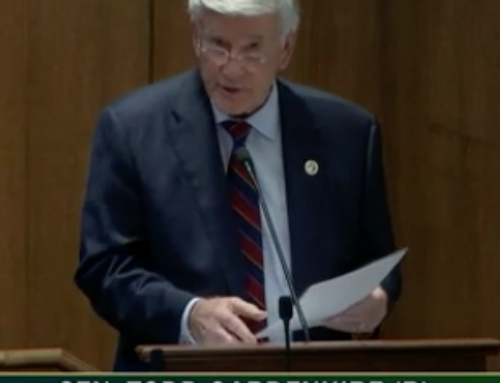TCOG answers state’s 5 questions on charging fees for public records
The Office of Open Records Counsel is posing five questions about charging fees for public records at upcoming hearings Sept. 15-17 in Knoxville, Nashville and Jackson. Open Records Counsel Ann Butterworth is gathering comments in advance of making a recommendation in January on whether the law should be changed to allow governments to charge citizens to look at public records. Following are TCOG’s responses to the five questions.
1. Should the TPRA (Tennessee Public Records Act) permit record custodians to charge for inspection of public records?
No. New fees would choke off citizen access to a wide swath of public records.
Plain and simple, we believe that allowing government to charge per-hour labor fees will block access to public records. Some citizens will not be able to see public records because they cannot afford to pay the fee. Changing the state law to permit government to charge citizens to look at public records would create a new exemption to the Tennessee Public Records Act: A record is exempt if you cannot afford the fee set by the government official to see it.
We think that this would cause great harm to the integrity of our government and the ability of citizens to know what their government is doing. By choking off citizen access to public records, we choke off the oversight that is essential in a democracy.
We also believe that some government officials will use fees as a club to keep the public from seeing records that clearly ought to be public.
Per-hour labor fees are easy to inflate and abuse. We recently saw a case in which a local government entity paid an outside lawyer $250 per hour to handle a public records request (including time spent driving to a meeting). Such exorbitant rates for questionable costs, in this case to the tune of more than $6,000, would be passed along to the citizen requesting to inspect records under this proposed new law. Any challenge to fees would have to come through a lawsuit, which is often too expensive for a citizen or a media organization. Even then, the deck is stacked against the citizen. There is no penalty for violating the Tennessee Public Records Act. And even if a citizen prevails in a lawsuit, showing how the government violated the law through excessive fees, there is no guarantee the citizen can recover court costs or attorney fees.
New fees to look at public records would also have a chilling effect on journalism in Tennessee. There is no question new fees would reduce the ability of individual journalists and local news organizations to report on government. Many will no longer be able to afford to look at government documents as they are doing now — particularly large volumes of documents that can help the public understand the impact of public policy, hold government officials accountable and verify accuracy of government statements.
We also think there are better ways to reduce the cost of fulfilling public records requests that don’t require blocking citizen access to records. We believe the best place to start is to examine processes, and to use proven techniques to eliminate waste and inefficiency.
Finally, public records have already been paid for by citizens through their taxes. They should not have to pay again to simply look at them.
2. If charges for inspection are permitted, should charges for inspection be governed in a manner similar to charges for duplication (Schedule of Reasonable Charges)? If not, why not?
Charges for inspection of public records should not be permitted. But changes should be made to the Schedule of Reasonable Charges to address the abuses taking place in the system now when citizens want copies of public records.
The Schedule should prohibit or greatly limit per-hour labor fees for copies. Per-hour labor fees were never part of the recommendations by “Sunshine-in-Government” Legislative Committee that studied these issues.
We believe some of the excessive fees we see for copies now are often tied to overly expensive per-hour processes to review and redact documents by attorneys instead of less expensive staff personnel. We believe that other less expensive ways to fulfill public records request are available, but have not been embraced, nor studied. We also believe that some government officials have used per-hour labor fees as a way to discourage, hinder or delay access.
The Schedule also should prohibit per-hour attorney charges related to an attorney’s research and advice to a government agency about fulfilling a public records request, but not directly related to the cost of compiling the records themselves.
The Schedule should allow a way – short of a lawsuit – for citizens to challenge and reduce excessive fees associated with getting copies.
3. If charges for inspection are permitted, should any public records such as meeting minutes, agendas, and audit reports be exempted from inspection charges? Why?
Charges for inspection of public records should not be permitted.
We support making commonly requested documents widely available on a local or state government’s website, if they have one. We do not support the idea that some public documents should be free to view and others should come with a price tag.
By allowing a governmental agency, such as the Open Records Counsel, to decide which documents should be “free,” you insidiously create a segment of public documents that citizens can’t see because they can’t afford to pay the fees. This would wrongly allow the Open Records Counsel, through the Schedule of Reasonable Fees, to exempt a very large number of public records (perhaps the majority of public records) from public access for those who cannot afford to pay.
We do not think this power to reduce access to certain public records is or should be vested in the Office of Open Records Counsel. Only the Legislature should be able to make laws exempting public records.
4. If charges for inspection are permitted, should the factors listed in Tenn. Code Ann. Section 8-4-604 related to charges for copies be considered for inspection? If not, why not?
Charges for inspection of public records should not be permitted.
We believe some of the principles listed in T.C.A. § 8-4-604 are worth repeating here because we do not believe they are being implemented fully in practice in local and state government, nor are they fully supported in the Schedule of Reasonable Fees or the FAQs on the Office of Open Records Counsel website.
Here are some of those principles, in T.C.A. § 8-4-604 (a)(1)(A)(ii), outlining what the Office of Open Records Counsel should consider in the establishment of the Schedule:
(ii) The principles presented by the study committee created by Acts 2006, ch. 887:
(a) That state policies and guidelines shall reflect the policy that providing information to the public is an essential function of a representative government and an integral part of the routine duties and responsibilities of public officers and employees;
(b) That excessive fees and other rules shall not be used to hinder access to nonexempt public information;
(c) That, in accordance with § 10-7-503(a)(7)(A), no charge shall be assessed to view a public record unless otherwise required by law;
(d) That the requestor be given the option of receiving information in any format in which it is maintained by the agency, including electronic format consistent with title 10, chapter 7, part 1; and
(e) That when large-volume requests are involved, information shall be provided in the most efficient and cost-effective manner, including but not limited to permitting the requestor to provide copying equipment or an electronic scanner;
Despite these principles, the Office of Open Records Counsel has given permission to local and state government to prohibit a citizen from using his own copying equipment (such as a smart phone that takes pictures), as well as to refuse to provide documents in the native format in which they are maintained by the agency (such as data in a database format).
The Schedule also does not protect citizens against excessive fees or rules that hinder access. In fact, in the FAQ on its website, the Office of Open Records Counsel suggests that local rules by government limiting access may be permitted. A good example of a record denial based on a local rule is in Sumner County when a local school board denied a public records request because the requester did not follow a local rule of sending the request by U.S. Postal Service.
We also believe that because the cost of redaction is driving up the cost of copies of records, the Office of Open Records Counsel should take proactive measures to study and reduce the need for expensive redaction, including encouraging different methods or using available technology to reduce the cost.
5. What amendments or changes should be made to the current Schedule for Reasonable Charges related to duplication of records? Why?
The Schedule of Reasonable Charges for copies should be updated annually through a full and robust public process so citizens can review potential changes, weigh in and be heard.
We believe that the Schedule would better serve citizens and government if the Office of Open Records Counsel would only adopt changes to the Schedule that are approved by a broad consensus of the Advisory Committee on Open Government. Currently, the Office does not seek any such approval or consensus from ACOG, which is a broad cross-section of citizen and government representatives appointed by the Comptroller of Tennessee.
Any change to the Schedule should be measured against each of the principles laid out in the law to govern the Office of Open Record’s Counsel to develop the schedule.
For example, the Schedule should allow citizens to make their own copies of public records, which is outlined clearly in the principles, but not adopted in the current schedule. Citizens should be allowed to receive electronic copies of records in the native format in which they are stored, which is also outlined in the principles but not in the Schedule.
The Schedule governing copies should protect citizens against inflated costs by not allowing exorbitant per-hour charges, such as $250 per hour for an outside lawyer.
The Schedule should prohibit local or agency rules that hinder access.
Share your thoughts about charging fees for public records
The public can comment online and in public hearings in Knoxville (Sept. 15), Nashville (Sept. 16) and Jackson (Sept. 17). You can email thoughts to [email protected] and get information about the public hearings at the Office of Open Records Counsel website.
Related:
Jack McElroy: Should citizens have to pay to look at public records?
Loudon mayor supports charging for public records
Tennessee open records may get a little less open





